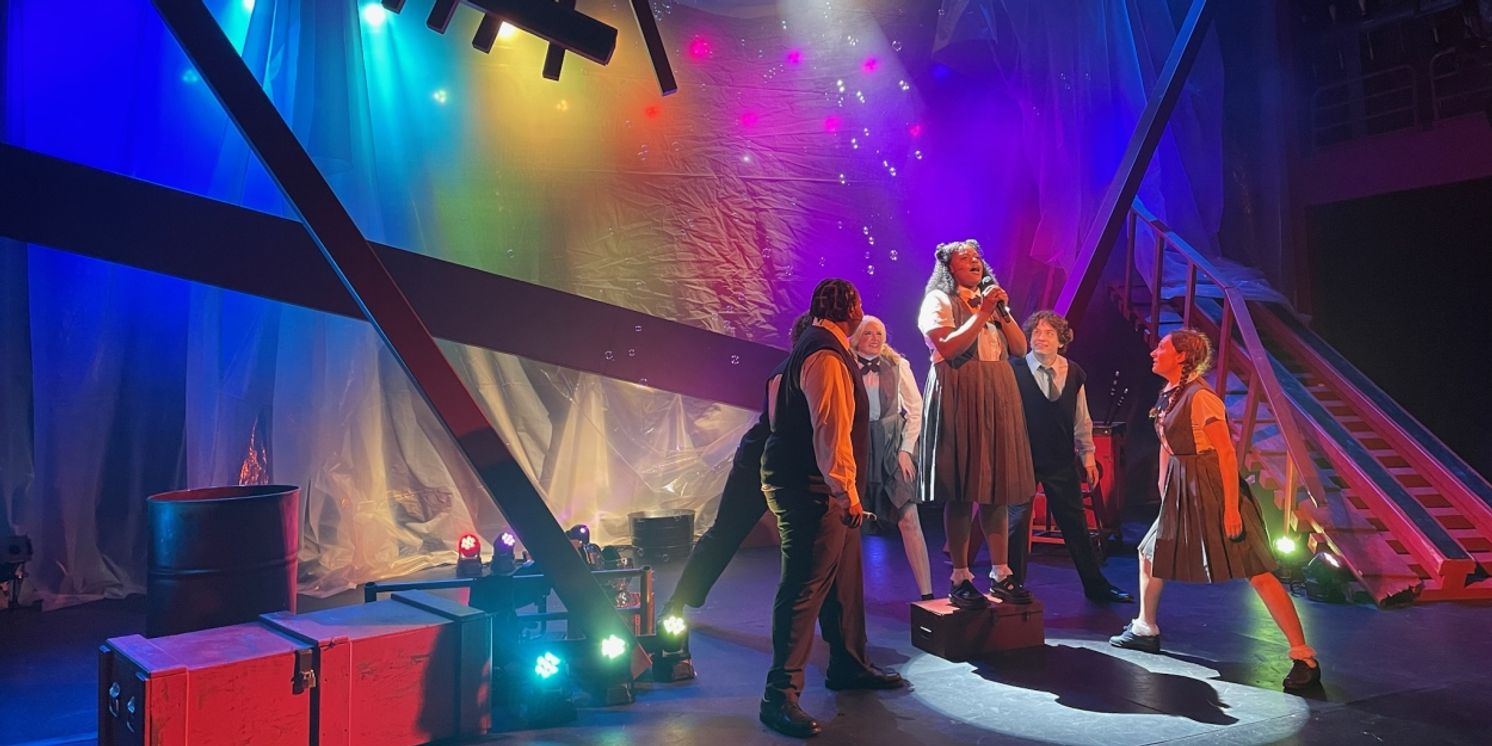Review: RIDE THE CYCLONE at The Contemporary Theatre Of Ohio
Musical combines quirks with raw emotion

RIDE THE CYCLONE, the latest production of The Contemporary Theatre of Ohio, succeeds because it follows the John Hughes’ “Snowflake” Principle. When viewed as bunches, high schoolers can seem the same. However, in Hughes’ movies like “The Breakfast Club,” “Sixteen Candles,” and “Pretty in Pink,” when students are viewed as individuals, audiences can see the patterns, beauty, and flaws that make each one unique.
Directed by Leda Hoffmann, the quirky musical about the six ill-fated members of the Saint Cassian Chamber Choir of Uranium City, Saskatchewan is more like an eccentric Tim Burton film than a Hughes hug fest. However, the moments of genuine humanity and sentiment keeps the show from going off the rails.
RIDE THE CYCLONE opened April 18 and runs through May 5 at Studio One at the Rife Center (77 S. High Street in downtown Columbus).
Written by Jacob Richmond and Brooke Maxwell, the musical weaves together the individual tales of the six choir members killed in a freak roller coaster accident. An omniscient and ominous fortune teller Karnak (the delightfully droll Brian C. Gray) informs the recently deceased students -- Ocean O’Connell Rosenberg (Becky Keeshin), Ricky Potts (J’von Jones), Mischa Bachinski (George Lorimer), Constance Blackwood (Shauna Marie), Noel Gruber (Nicholas McInturff) and Jane Doe (Mackenzie Leland) – only one of them can return to the land of the living. But there’s a catch: “The one who wants to win it the most shall redeem the loser—in order to complete the whole.”
When Ocean complains, “That doesn’t make any sense,” Karnak answers, “I trade mostly in prophecies that don’t make any sense--until they actually do.”
Karnak applies paints to the portrait of each participant, identifying each student by their zodiac sign, catch phrase, and favorite ride at the amusement park. Then, each student must present a reason in a personal song style explaining why he or she should be chosen.
The overachieving Ocean naturally goes first. Ocean was born into a family of “far left-of-center humanists … who wanted to live a carbon-free lifestyle.” However, her life was forever changed when she discovered an album tucked in her parents’ vinyl collection: “Up With People.”
Initially, her song “What the World Needs Now,” reflects an upbeat, optimistic message, but slowly reveals the world needs more people like Ocean and less like the possible future selves of the other choir members: “You got the sandwich artist, the security guard? The Wal-Mart greeter with an overdrawn credit card.”
Similarly, Constance, Ocean’s best friend who the overachiever called a “cup of diabetes,” appears to be saccharine sweet. Then she smudges that image by freaking out when Jane Doe asks her to comb the hair of her headless dolly (“Did anybody just pee themselves a little?”) and revealing she lost her virginity to a carnival worker in a Port-A-Potty three hours before embarking on the Cyclone.
Gruber has the show’s best catchphrase, “Being the only gay man in a small, rural high school is kind of like having a laptop in the stone age. I mean, sure, you can have one, but there’s nowhere to plug it in.” In his song, “Noel’s Lament,” he dreams of his ideal life as a doomed prostitute in post-World War II France: “So now I sell my love for opium in some rat-infested Chinese dive. At night, I burn myself with cigarettes just to somehow prove I’m still alive.”
Mischa’s backstory is about as dreary as the one Noel longs for. Karnak reveals the choir bad boy was born in Ukraine and his mother forged his birth certificate to read that Mischa was two years old and toilet trained. Karnak states, “His adoptive parents were surprised to see their toddler had a five o’clock shadow and a slight trace of alcohol on his breath.”
For most of his life, few believed Ricky Potts could speak, let alone guess at the crazy thoughts he harbored in his head. After watching his father, a Pentecostal preacher/snake handler die after sustaining a lethal bite from JoJo the snake, Potts contemplates a world where he is a Cat Jesus. “And they listened. And they heard my message, for I was singing notes that only cats or cat people could hear. A G#, Five octaves above middle C.”
The only one who doesn’t appear to have a crazy story bouncing in her head is Doe. That’s because Doe doesn’t have a head to put it in after being decapitated in the accident. Doe is so much of a wall flower that none of the choir remembers her name. In the Ballad of Jane Doe, she describes herself as “A melody floats through the air. When silence falls, does no one care? Another sad, forgotten tune. Another song that no one knows.”
For all its twists and curves, RIDE THE CYCLONE still wrings out genuine emotion. Like a good Hughes movie, RIDE THE CYCLONE’S ending, a beautifully constructed slide show of the chosen one’s life in the post-accident world, leaves the audience with some real world compassion, empathy, and sympathy as it walks away from an idiosyncratic, unpredictable play.
Photo credits: Leda Hoffmann
.jpg?format=auto&width=1400)
.jpg?format=auto&width=1400)
Reader Reviews
Videos

